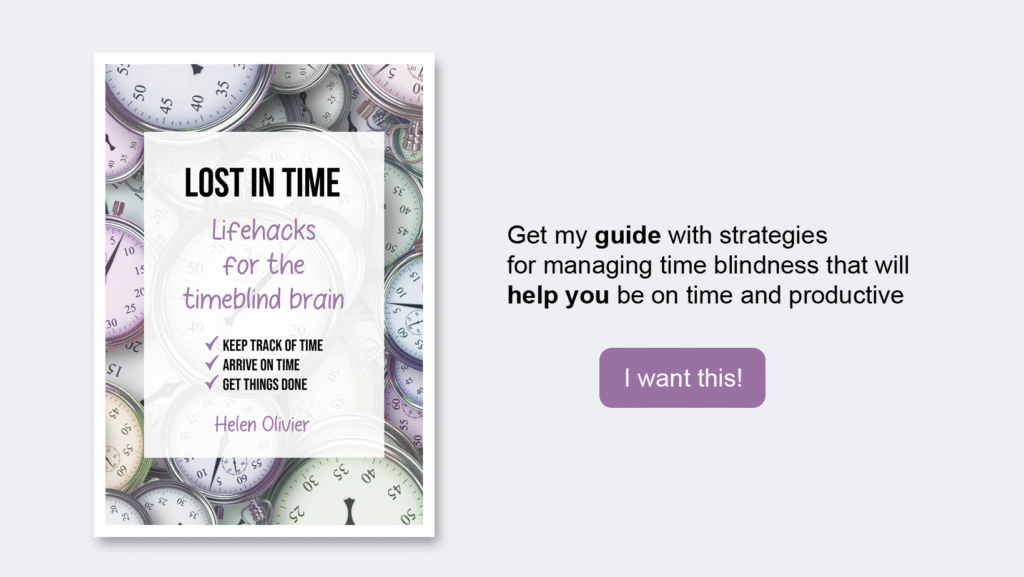You are running late. You are always running late and you don’t understand why. You woke up extra early, and yet you are late. Again. The stress and shame is eating at you. You desperately WANT to be on time, try to be on time, just to fail every time. People are angry at you. They think you are lazy and disrespectful. They don’t understand that you are angry at yourself too. That you are trying so hard. Everyone around you is able to show up on time, and you are not. Again and again, you try, you promise yourself you will do better, and you fail.
Do you see yourself in this description? If your answer is yes, there is a high chance that you have time blindness. It is a part of executive dysfunction that often comes with being neurodivergent, especially with ADHD.
Disclaimer: This blog is based on personal experience and is not medical advice. Always consult a qualified healthcare professional before making changes to your health, treatment, or medications.
Time blindness means you don’t have an internal sense of time
When you have time blindness, you just don’t possess the internal sense of time that everyone around you seems to have. You can’t tell easily what time it is or how much time has passed. You can’t estimate how much time a task will take and because of that, you are always trying to finish it at the last moment. You are missing deadlines. An hour can seem like ten minutes to you. A day can pass before you notice. And you are always, always late.
The important thing is that it isn’t your fault. It’s just a way your brain is. Neurotypical people have a working inner clock and you don’t. That puts you at a disadvantage in daily life.
Is time blindness real?
A lot of people doubt that time blindness is real. But scientific research suggests that time perception really is different for people with ADHD and autism.
Studies have shown that executive functions—the mental processes responsible for time management, working memory, and self-regulation—are typically less active in ADHD brains. This can lead to “now” or “not now” thinking, where only the immediate present feels real, which makes it difficult to plan for the future. The result? A common feeling of being “lost in time” and struggling to organize the day’s tasks effectively, despite best efforts.
For those with autism, sensory processing differences and hyper-focus tendencies can make time seem to either drag on or fly by, which adds to the disorientation around time perception.
Understanding that time blindness is a real and valid experience can be freeing for those who experience it. They can stop thinking of themselves as “lazy” or “unmotivated” and seek out strategies that can support them.
What causes time blindness?
Apparently, most people have an inherent sense of time because their brain is passively aware of things that indicate the passing of time, like pulse rate, light level,s and temperature changes. ADHD brains aren’t able to do this.
Research has also found that people with ADHD have lower levels of dopamine, the brain’s “feel-good” chemical that helps with reward and motivation. This neurotransmitter also affects how we perceive time. For people with ADHD, the shortage of dopamine means they might miss the internal signals that help others keep track of time.
Time blindness symptoms
Time blindness complicates a lot of things. It’s not only the chronic lateness that is the most obvious symptom. People with time blindness also have difficulty estimating how long tasks will take. This leads to poor planning and a desperate, stressful rush to finish before a deadline. And it can create a domino effect where one miscalculation leads to the complete ruin of your schedule.
Another symptom is the inability to prioritize tasks effectively. When you don’t have a good idea of how much time is available or required, prioritizing is difficult. That means you waste time working on things that aren’t important and delay those tasks that actually are.
Procrastination may also be a symptom of time blindness. If you don’t have a good idea how much time you have left to finish a task, it can be tempting to put it off.
A lesser-known symptom is difficulty with transitions. Ending a task to begin another or shifting focus from one task to the next can be hard.
A difficulty planning ahead is also a symptom of time blindness. Planning for the future can be hard when you have difficulty imagining that future. The brain of a person with time blindness knows only two times – now and not-now.
You may feel like time is passing too quickly and it’s getting away from you. You have barely woken up in the morning, and suddenly it’s afternoon,n and you don’t know where the day has gone. This results in things like missed appointments, overcommitting because you uńderestimate how long tasks take, or losing yourself in an activity as hours fly by.
Problems people with time blindness face
Time blindness affects many areas of life, like work and productivity, personal relationships or academic challenges. In work, you keep missing deadlines, forget meetings and your schedule is completely disorganized, which can have a serious impact and even get you fired.
Your personal relationships may suffer too. When you are arriving late all the time, people may feel you are disrespectful of their time. This can cause strained relationships with friends, family, and partners. Loved ones may feel neglected or unimportant when time commitments are not honored, and frustration and misunderstandings may arise.
Time blindness without ADHD
But it’s not only ADHD that can cause time blindness. Mental health conditions like anxiety and depression can do it as well. They can significantly impair your ability to focus and concentrate, which leads to difficulties in managing time. Anxiety often causes a state of constant worry and distraction, while depression, on the other hand, can cause a lack of motivation and lead to procrastination. Both conditions create a disconnection from the present moment, which makes it challenging to keep track of time effectively.
Another thing that can impair your perception of time are high levels of stress. Some neurological issues, like traumatic brain injuries or certain developmental disorders, can also disrupt normal perception of time.
Strategies for time blindness
Time blindness is something you can’t change, but you can learn to work with it. With careful management, you will be able to greatly improve your punctuality and orientation in the flow of time.
Externalize your sense of time
When your internal sense of time doesn’t work properly, you need to externalize it. That means using alarms, notifications, calendars, and so on. Wearing a watch can help you immensely because you will be able to remind yourself of the time as needed.
- Use a calendar that visually shows your week or month.
- Write down appointments and reminders in multiple places (paper planner + phone).
- Set alarms for transitions, not just events. (Example: “Start getting ready,” “Leave now,” “You should already be gone.”)
Use timers like anchors
Timers are a gift to the time-blind brain.
- Set one for how long you want to work—and one for when to stop.
- Use visual timers or apps that show time passing (like Time Timer or Pomofocus).
- Even just a 5-minute timer can help kick-start your brain into motion.
Use visual cues.
This can take the form of using Google Calendar, where color-coded blocks help show your day or week at a glance. Or try Tiimo, a visual planning app developed specifically for neurodivergent people. It uses icons, routines, and countdowns to gently guide you through the day. Many people say it feels more like a helpful buddy than a calendar.
Learn to estimate time realistically
Learn how to estimate the time that an activity will take realistically. Try timing yourself so that you know how much time your repeated routines really take. When you plan, take this realistic time estimate, and count the time backward from the deadline. Then the time you need to start doing the thing is clear. (Don’t forget to set an alarm for that!)
More useful strategies
You can find solutions for your time blindness in my ebook Lost in Time: Strategies for Managing Time Blindness. It offers actionable tips and advice tailored specifically for neurodivergent people like you. You will learn how to keep track of time, arrive on time, boost your motivation and get things done before the deadline. Check it out here!

Helen Olivier is a neurodivergent writer, AuDHD explorer, and professional overthinker with 40+ years of lived experience in the wonderfully weird world of ADHD + autism. She writes for people who’ve been told they’re “too much” or “not enough,” offering comfort, clarity, and the occasional executive dysfunction survival hack. Her blog is her way of turning daily chaos into useful insights for other neurodivergent folks.
This blog is based on personal experience and is not medical advice. Always consult a qualified healthcare professional before making changes to your health, treatment, or medications.





